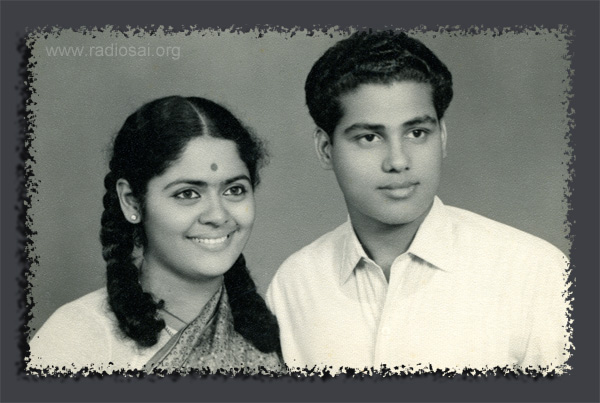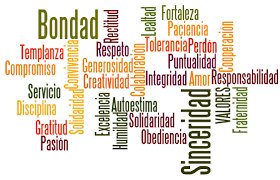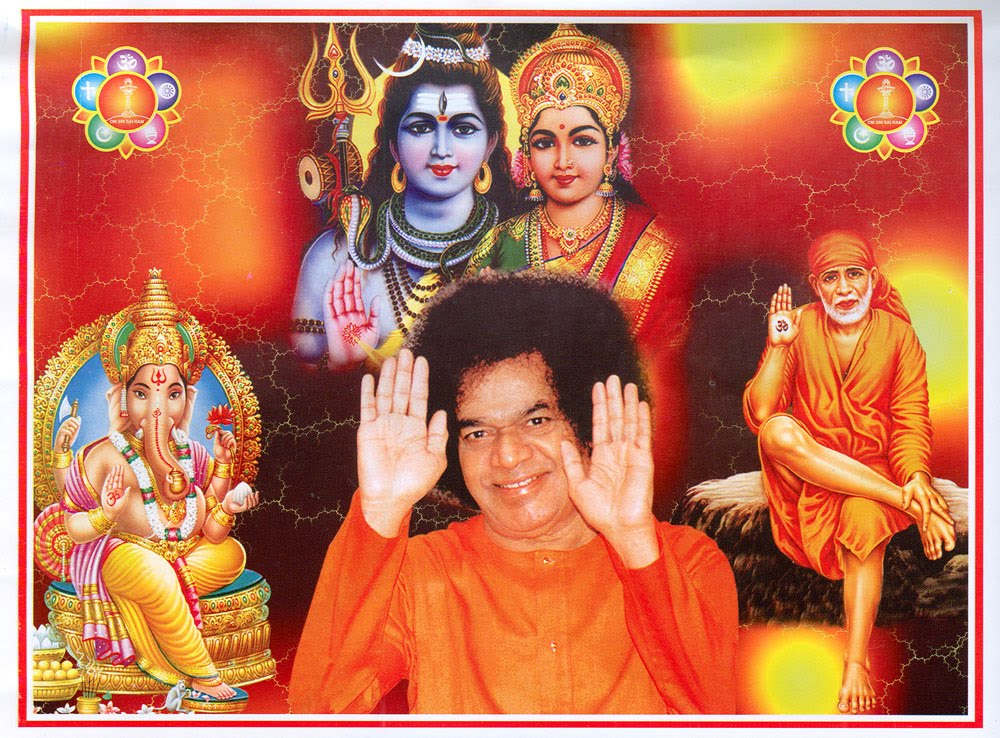A Life of Servitude
- an exclusive conversation with Mr. K. Chakravarthi
Part -1
In the grand story of the Sri Sathya Sai Avatar, a devotee who has played a key role is Mr. K. Chakravarthi, I.A.S. He was the first Registrar of the Sri Sathya Sai Institute of Higher Learning, and later the Secretary of the Sri Sathya Sai Central Trust. He now serves the Central Trust as a Trustee. Mr. K. Chakravarthi's association with the Sai Avatar dates back to 1975.An over-achiever by any measure, at the age of 24, he had completed his university education in Economics and Law, and was inducted into the prestigious Indian Administrative Service.
KM: Sai Ram Sir, you are one of the most seen, and perhaps talked about office-bearers of the ashram, and yet you have remained very private, and media averse.
During the period when Bhagawan was hospitalized, your name was making headline news on a daily basis, but we never heard from you. So let me start off by thanking you for coming to the Radio Sai studio for this conversation.
Last Days of the Avatar's Visit to Earth
Let's talk about life before and after that fateful day when Bhagawan was rushed to the Super Specialty Hospital - March 28, 2011. As the Secretary of the Trust at that time, and His close devotee, what do you recall of that day?
K. Chakravarthi: All that we can say is we were all traumatized. I had just come home from Prasanthi Nilayam, and half an hour later, I got a frantic call from the Yajur Mandir saying that Swami has to be rushed to the hospital, and that I should get back to Yajur Mandir. Hardly few minutes later, I was back in Yajur Mandir and we had to arrange the ambulance. The doctors were there and Swami had to be brought down. It was a fairly hectic time, and our reactions were rather slow, because however much we knew that Swami was not well, we were not mentally prepared to see Swami in a condition in which He had to be rushed to the hospital in an ambulance. And I think my mind was blank. All that I could do was I showed Swami (by gesture) that I am following His ambulance. So I went behind Swami's ambulance in my car.
KM: Was Bhagawan awake and conscious at this time?
K. Chakravarthi: As He came down, He was visibly conscious. He was in a chair; we had to take Him sitting in His chair. To what extent could things around Him have registered is very difficult to say. Well, we presume that He was, I think, in a condition in which He was at least aware of what is around Him, who were around Him. That's how it happened.
KM: The days that followed, were obviously very difficult for everybody, especially so for the members of the Trust â€" constant media attention and then the responsibility of handling the situation in the hospital. What was it like?
View the video from the below-mentioned link:
K. Chakravarthi: It is a question of being caught unawares firstly, because it is not as though that we were planning to take Swami to the hospital for a long treatment. At least I was always hoping that there will be some unknown, mysterious way in which Swami would pull Himself up and therefore there will be no need for Him to go to the hospital. Now having gone to the hospital and being told that His condition is serious, it was a question of waiting during those days; in other normal cases, people would expect recovery of their loved ones. But here was a case where I suppose more than He being the beloved of many, it was always a question of His extraordinary power by which He could recover Himself.
At one level your mind says “We have got to go through the normal procedures�, at another level I suppose you're not prepared to believe that these are the things which have got to be done as in the case of an ordinary patient.
It is very difficult for any person, not only me; I think it would have been the normal reaction of many people there. So, it became, a very prolonged stay. And a prolonged stay means you can think of it as a time for recovery. You can also think of it as a situation which is going downhill, physical condition being what it is. So, it is very difficult to look back and say precisely this is the moment in which hope was lost.
The Transition that Shook the Universe
KM: Understandably! And then once the Mahasamadhi happened on April 24, 2011, and for millions of devotees around the world, life just changed in a trice, but in your case it was even harder because you had the loss, the grief, as well as the added responsibilities to handle because the entire world was descending into Puttaparthi. What was going through your mind?
K. Chakravarthi: I didn't think that I was in any way responsible for handling many things which are happening around. No one could have thought that he's going to handle it single-handedly.
KM: But you were the Secretary of the Trust?
K. Chakravarthi: Yes, in terms of working out the details of when Swami's Body should be received, and how people will be allowed to offer their obeisance - there were details, which had to be addressed and you do it either mechanically or because you have been through a lot of training on handling situations.
 |  |  |  |  |  |  |  |
This was such a life-changing happening in the whole ashram, not only for me, but for everyone around. And perhaps for people who have not been around also. But then, I was not the only person. There were lots of others who were also in the hospital during those critical days, and all of us had to talk amongst ourselves and see what should be done, and even before the end came, there were lots of enquiries from people, from the Prime Minister's office, the Chief Minister's office, and as soon as the end came, we knew that we had to arrange for their coming and paying their last homage to Bhagawan.
So all those things were handled in a way in which activities in the ashram are handled when the VIPs come or when a large congregation of devotees comes. But this was a totally different type of congregation, a totally different type of visit of the very important persons in the country. But as I said, we knew that this has to be gone through, and I think all the people who are connected with this in one way or the other must have gone through in their own mind, I suppose, that this is something which mentally we were not prepared to accept.
KM: It's very hard to draw that strength in the moment of grief and loss and to stay together, and think of the logistics, I can't even think of a Head of State who has had such a send-off.
 |  |  |  |  |  |  |  |
| The divine Mahasamadhi, a transition that shook the Universe | |||||||
K. Chakravarthi: In certain cases like that, you prepare in advance, as to what should be done, what should be the protocol, etc. In the case of Bhagawan, it is rather difficult, because if you start preparing, it looks as though you have accepted the inevitable, and you do not allow for a margin of mystery.
And if you don't do anything at all, it looks as though you have been careless in handling the situation. So it is very difficult to prepare, and to stay not prepared.
KM: Indeed a fine line to walk.
K. Chakravarthi: Either way, you know people can say that 'well, they knew much earlier and they did not prepare.' Or they can say, 'they should have foreseen but they didn't.' So it was a very difficult situation.
KM: Understandably so, yes.
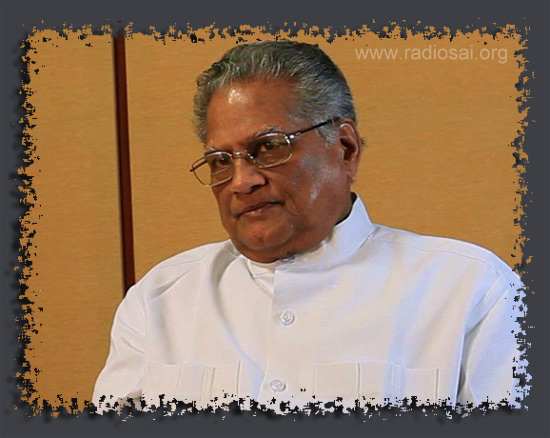 | |
| Mr. Chakravarthi in the Studios of Radio Sai, 21 November 2012 |
K. Chakravarthi: So I think this must have been the reaction of many people connected with that. If you prepare, well, you can be told that 'You didn't share that information with all of us.' And if you hope against hope that things are going to improve and still the worst follows, then they will say that 'You have been singularly inefficient in anticipating and providing for.'
Grappling with Grief, Media Circus Innuendoes
KM: Talk of walking on a razor's edge! Now during this period, Sir, suddenly the Trust was making a lot of headline news and it was often being described as the all-powerful Sri Sathya Sai Central Trust with global assets worth some astronomical amount, and the spotlight was on the Trustees from both the media and the devotees. Yet, it appears you consciously chose to lie low and stay away from the limelight. Why? Was that a considered decision?
K. Chakravarthi: Now, I think there are a few things in this. Many of the comments which I found in the press had not been based on information on facts.
KM: Very true.
K. Chakravarthi:And none of the people who had written anything had met me or, for that matter, any of the trustees earlier to ascertain the facts about what they are going to write. So I think it was more of a speculation in terms of the Trusts' property and its worth. The difficulty at the time was that when people wrote that the Central Trust has assets running into thousands of crores, it was an instance of utter incredulity for us. We know what the situation is; we know how much assets are there.
So that's why we had to wait for some time until all these things come to a certain sense of normalcy, before addressing the press to give them a complete picture of what the Central Trust assets are and what its income is, and to point that a number of things which are not directly connected with the Central Trust might have been possibly attributed to the Trust by the press. (Transcript of the Press Meet held on 28 June 2011)
And we had to possibly bring to their notice that there are a number of organisations all over the country and the world which bear the Sri Sathya Sai name. They are not directly connected with the Central Trust as an entity. We had to tell them there are Sri Sathya Sai State Trusts, and other sister Trusts, and there is an Organisation abroad which is not a legal entity, the Sri Sathya Sai International Organisation.
These are all again totally outside the purview of the Central Trust, and we had to inform that the territorial jurisdiction of the Central Trust is only India, and Sri Sathya Sai Central Trust is one organisation which does not own any property in any part of the world other than India. So I think these must have come possibly as a surprise to them, but at the same time having made wild guesses about the worth of the Trust, perhaps they didn't want to revisit those figures and they just came to a certain understanding of the facts as they were put out to them.
 |  |  |  |  |  |  |  |
| Members of the Trust and the Media Coordinator addressing the media, 28 June 2011. The first press meet post the Mahasamadhi was held on 28 Apr 2011 | |||||||
KM: It must have been a very difficult time for the Trust to grapple with the situation on the ground as well as the negative media attention. Did you all strategize on how to handle it?
K. Chakravarthi: See, the question is that, it is not the Central Trust alone that was being asked. We can say that we should have people who are connected to the Central Trust, who can give some facts and figures. Now immediately after such a great traumatic event for all of us, it was not possible for us to come and meet the press in a very cold-blooded way and say that these are the facts. So, we had to allow really for all people to sort of settle down as it were.
KM: Because some closure was required.
K. Chakravarthi: And there was a need to gather one's wits under such circumstances and then together reckon what are the things being asked in relation to what happened. We had to really think in terms of giving a write-up itself. There’s no point in just giving explanation. We put forth a write-up and said that these are the facts.
KM: Yes, and the Annual Report.
Separating the Facts from Half-Truths and Lies
K. Chakravarthi: (We had to tell them) These are the lands that we have and these are the buildings; and these are connected with the work. The lands that were given by the Governments of the states of Andhra Pradesh and Karnataka, and these were all for specific purposes, and those purposes have been carried out by Bhagawan till now and will continue to be carried out by the Central Trust.
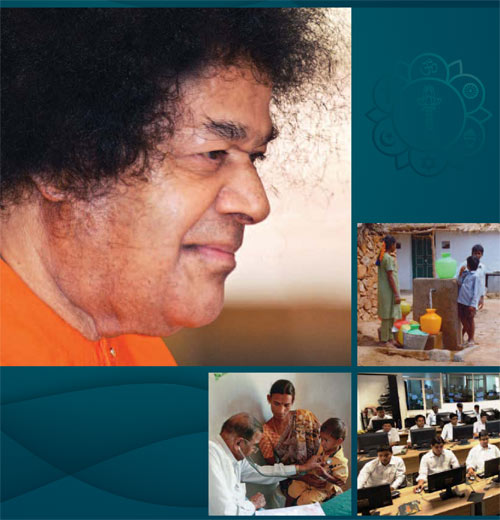 |
If you talk in terms of the value of assets, you will find in our books of accounts as zero, because these were all given free, and today's market value may be anything, you can compute, but then these are not real estate in the sense in which we sell the property, make money or do anything of that nature. These are linked to certain obligations on part of the Central Trust. If land is being given by the Government of Andhra Pradesh for Anantapur Campus, it is being run for more than 30 years as a university.
And even earlier as a college and this is a continuing obligation of the Central Trust. We have to do that and take care of it and ensure that the campus of the university there runs. Similarly, if there is a land given by the Government of Karnataka to the Central Trust for putting up a building for housing a free Super Specialty Hospital, it again is an obligation. The land has been given but once again on the condition that we would run a free hospital. So in fact you should look at it not as an asset; it is as an obligation made out by the Government; each so called “asset� has an obligation attached to it.
It takes time for people to understand that if you have some acres you don't multiply it by the current market value, and say that this is asset value and so on, and even there again, in the books of accounts, it will be shown for whatever value in which it was given. So I think it took time for people to understand that the value of the property which they had given had no basis on facts pertaining to the Central Trust.
And if they had thought that because the name Sri Sathya Sai is there, all of them come under the umbrella of Central Trust, it was not so. And I think it took some time for them to understand that the Sri Sathya Sai Organisation is different from Sri Sathya Sai Central Trust, and Sri Sathya Sai State Trusts are different from the Sri Sathya Sai Central Trust. So I think it has taken some time but I'm sure people have now come to understand what all these are about.
A Life of Servitude
- an exclusive conversation with Mr. K. Chakravarthi
PART 2
Organisational Verticals Founded by the Avatar
KM: How do these verticals intersect, namely, the Sri Sathya Sai Seva Organisation, the Sri Sathya Sai State Trusts and the Sri Sathya Sai Central Trust?
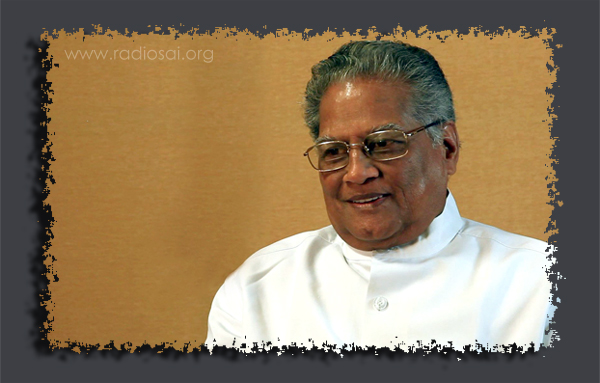 |
K. Chakravarthi: There are two ways of looking at it. Bhagawan had made it clear that the organisation He blessed to use His name ‘Sri Sathya Sai’ was more for the sake of devotees getting together and engaging themselves in service, not for the sake of Bhagawan but for the sake of their self-fulfillment. After all, what's the purpose of doing service? It is not for Swami's sake. Serving selflessly in a community could be in the form of value education, a non-formal setup like Bal Vikas, it could be by way of bhajan mandals where people could congregate and then sing the glory of God, or organize medical camps or veterinary camps in order to provide some relief to the people in those areas.
All these things are not meant merely to provide emotional and physical relief to people, but also to really refine one's self and also promote a sense of selflessness in human beings so that you not only care for yourself and your immediate family, but you're expanding yourself by thinking about others, by doing work for others. So, this enlarges the devotee's vision of what one is meant to be.
Swami made it clear that whether it is at a district level or state level, these activities have got to be done from the point of view of giving cohesion to the setup. You have a district level, there are a set of devotees who get together and organize. Similarly at the state level, and then all the states put together create the All-India Organisation and similarly Organisations in different countries are set up, but they are all meant to be for the sake of doing not only social service but also for promoting one's own spirituality.
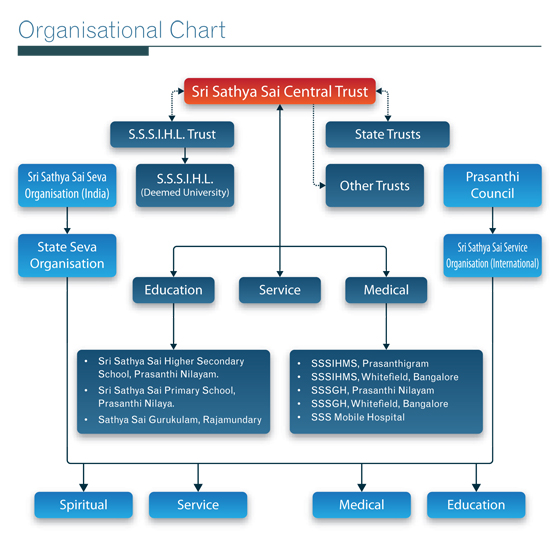 | |
| Source: Annual Report of the SSSCT (2011-12) |
Here is an Organisation which is a spiritual Organisation but from Swami's point of view, spirituality is best attained through service. Therefore it's a spiritual Organisation, it's a service Organisation, and the basis of it is spirituality. The expression of it is service.
KM: How do the Sri Sathya Sai Seva Organisation of India, for instance, and the Sri Sathya Sai Central Trust connect?
K. Chakravarthi: The Central Trust is a body which is governed by the laws of the land, especially Income Tax Act, and the Religious and Endowments Trust Act. These are the laws which govern the setting up and the functioning of the Trusts in the country and the state. So, the Central Trust has to apply for Income Tax exemption for donations received; the people who give money as donors have to get eligibility to deduct their income for tax purposes; that means you have to get an exemption from the Income Tax Commissioner.
Similarly, if you were to carry on work as a charitable trust in the state of Andhra Pradesh, for instance, there is an A. P. State Religious and Endowments Trust Act. So, all the activities have to conform to these provisions and whatever reports were to be submitted periodically to the Government in the Centre or even the state, that we complied with.
Now, for instance, another Act which is the Foreign Currency Regulations... not only our Central Trust but many, many Trusts in the country receive donations from abroad, and they are supposed to be regulated by the Foreign Contribution Regulation Act. We have to send our returns to the Government of India. So these are things which are to be done in a legal way, accounted for and complied with.
The Sri Sathya Sai Seva Organisation is a congregation of devotees. And they have their local service activities, and then in order to facilitate some of these activities, there are also the State Trusts.
Now, the State Trusts, much like the Central Trust also apply for exemption from the governments concerned and carry on their activities in the manner in which they ought to be done. If any activities at the State level are to be done, then it is possible that those who are organising the various functions such as medical camps - they give a budget that this is what is required to be done. And if the State Trust is in a position to extend that assistance; they do so. There should not be a collection of funds in an unaccountable way.
So, it should be systematically done, it should be transparent and no activities are done by way of a local collection which is likely to really harm the reputation of an organisation which bears the name of Sathya Sai.
Seva Dal: The Lifeline of the Sai Mission in India
The organisation has its relevance. Now for instance, you look at the volunteers, after all it maybe the biggest spiritual voluntary organisation in the country.
Seva Dal plays a very major role in maintenance of the Hospitals, especially Super Speciality Hospitals - both men and women volunteers take a lot of responsibility in keeping the whole place clean and tidy. They do so in General Hospitals and in the Ashram.
KM: And the museum, the canteens and the schools.
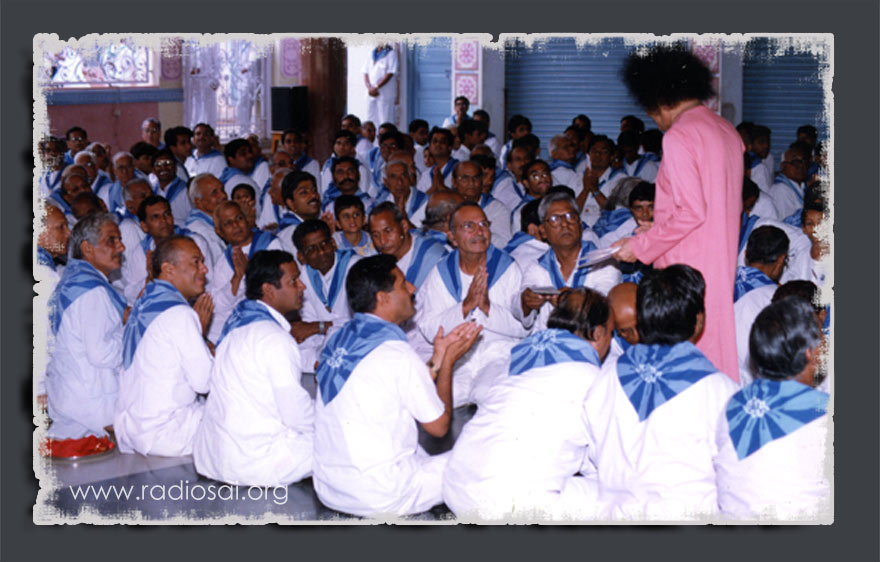 |
| The Seva Dal are the very backbone of the Sri Sathya Sai Seva Organisation |
K. Chakravarthi: Everywhere, all institutions â€" schools, colleges, general security, and then they are at the service of the large number of devotees who come. We don't use the word crowd here; we use the word congregation because it's a congregation, it's not a crowd. These are all people who come out of love and reverence for Swami. They need some assistance here and there whether it's a question of being seated or going into a canteen for food or perhaps buying books. Any activity within the ashram also has to be sort of regulated in a way in which people find it easy to get things done.
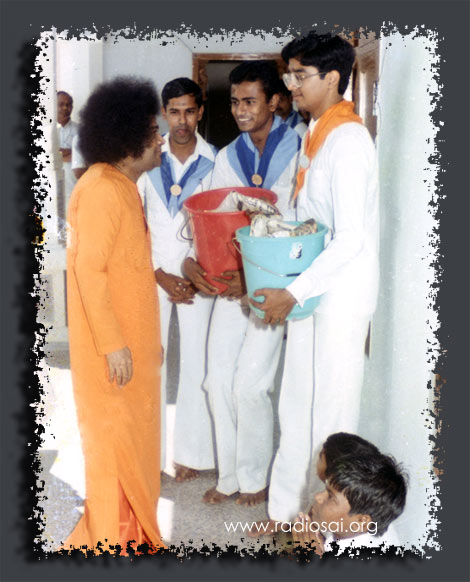 | |
| Sai Seva Dal, ever ready to serve in the name of Sai |
And these Seva Dal volunteers manage during major activities like 23rd November Birthday Celebrations. When Swami was there, the congregation of people who came were not counted because you just don't count people, the heads, etc., but you see a vast sea of faces and those people have to be taken care of whether it is a water distribution in the Hill View Stadium… Every activity which you can think of is all done by these Seva Dal volunteers who are the heart of the Sri Sathya Sai Seva Organisation.
They come from different parts of the country and if you look at the national integration element of this, it's a very revealing thing because people from different parts of the country, from different states come on a rotation basis. I do not know whether there is a similar organisation in the country in which people from different parts of the country come and render such voluntary service. And what is it that they gain? They spend the money but the type of satisfaction they get by rendering this service according to them must be far more than the monetary value of the trip because by coming and going back, they would have spent some money. But I think it is more than compensated.
KM: And used up their holiday time, family time.
K. Chakravarthi: But it is not merely considered as a vacation; it is considered as a seva; it is something which uplifts them.
It's not merely question of coming and going. It's a question of participating in a set up in which the higher instincts of men are touched by the very presence of Swami.
KM: And as a daughter of two life-long Seva Dals, I can say Seva Dals look forward to coming to Puttaparthi as a great spiritual blessing.
K. Chakravarthi: It is. That's what Swami used to say; visiting this place itself is a source of strength... used to use the language of recharging one's battery. But the idea is that you come here once a year at least and feel uplifted, ennobled; you are part of something, a wider whole and it invests the person's life with a very special meaning and significance. It's not to be measured by ordinary things with which we normally measure our activities in the normal world.
Demystifying the Central Trust, its Functioning and Priorities
KM: Very true. Let's talk about the Trust once again. Now that the mainstream media attention has reduced, there are some questions that still linger in the minds of our devotees. For instance, since the Mahasamadhi, what steps has the Trust taken to reengineer itself for preserving, nurturing and expanding the legacy of Bhagawan Baba?
K. Chakravarthi: The Sri Sathya Sai Central Trust does not require reengineering; it just...
KM: But it had a sole Trustee till almost the Mahasamadhi.
K. Chakravarthi: Yes but the year before, Trustees were inducted by Swami Himself. Swami had been not merely a Founder Trustee but He was a sole Trustee for a long time.
KM: And the major decision maker, one would guess.
 |  |  |  |  |  |  |  |
| Reporting to the Divine Boss - paying rapt attention to Divine instructions | |||||||
K. Chakravarthi: Yes, He was... I would say that all decisions were made by the Founder Trustee; He was also a sole Trustee. If the Sri Sathya Sai Central Trust has to do something after Swami's Mahasamadhi, it is the human beings who have been appointed as Trustees who have to get together and take some decisions on the basis of their best judgements.
When Swami was in the body, it is not as though the people involved gave up their judgement, but then they knew that the supreme judgement was vested in Him and therefore it was not necessary for people to take a position and then see whether this will meet with the approval of others and then come to a consensus and then do these things.
Anything that had to be done, you'd go to Swami and say, “Swami, this is the thing that needs to be done� and He asked you certain questions, you replied and He gave the decision; you carried it out; whether it's small or big it makes no difference. But when people in the physical absence of Swami have to take a decision, then there is no one single person who takes a decision.
So, the people who would have worked with Swami in various capacities, meeting in His presence know how Swami gives instructions. But, they are now put in a position where they have to look at these issues before them â€" whether it's a question of Hospital administration or giving assistance to the University or take some decisions regarding the activities in the Ashram, whatever it is. But there is a need for people to get together, discuss and then arrive at a conclusion and then take steps to implement them.
KM: What is a typical Trust meeting like? Do you all pray before you start?
K. Chakravarthi: Yes, this is ingrained in all of us; nothing here is begun without invoking the blessings of Swami. So, like it used to happen even when Swami was there, any official meeting which we used to conduct also started with Aumkaram. So, this tradition is very much in us and we carry it out.
KM: And you are 9 of you, I remember the media was dubbing you as the 9 planets, the 9 Ratnas, the 9 gems. Now, are the 9 gems united in their vision?
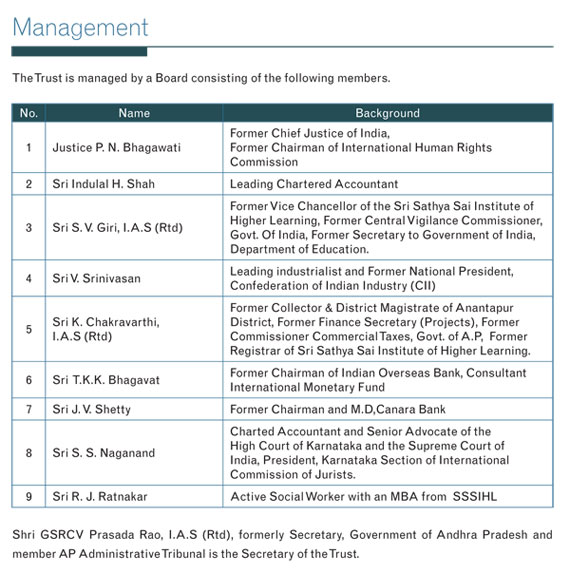 | |
| Source: Annual Report of the SSSCT (2011-12) |
K. Chakravarthi:Basically, I would say that there can be no difference in terms of perspectives because it is a Sai perspective ultimately. But in terms of emphasis, in terms of the nitty-gritty details, now each one perhaps brings their experience, their judgment, their wisdom, their own perception. And what normally emerges at the end of it is a consensus and we say “Yes, this could be done, we will do that.�
So, we do not go by a majority/minority view because that polarises issues. What we normally do is that when some differences in perspectives are there, then we go through these things again and again, more by way of clarifying in one's own mind, by listening to a lot of people around you and then say that this seems to be the preferred way of doing things and therefore there is a consensus that emerges â€" not out of a formal mechanical way of building consensus but a way of spontaneous understanding of each other's position.
And the coming out of that understanding is a way or an action programme. So I at least have not seen any meetings in which the differences are insurmountable or that it is has led to any clash of opinions. I mean these are things perhaps people want to believe because I think, they can't easily think that 9 people can get together and work in a harmonious way on a day-to-day basis. It may not be 9 all the time because it's quite possible that some of the members because of some reasons â€" ill health, or other preoccupations may not be attending a particular meeting.
But those who attend the meeting do this work as a dedication to Swami's work. It is not personal work that you are carrying out in the Trust. If you talk of a Hospital, what does it represent to us? It is not a mere building; it's no doubt a magnificent structure â€" architecturally beautiful and it has won the awards, national and international; these are things alright but then what does it signify? It signifies life and it is a living institution. It will continue to be a living institution. Look at the way in which the doctors are performing, the nurses, the technicians, the administrative account staff â€" everyone. There's a great identification on their part with a mission.
KM: And a higher purpose and drive.
K. Chakravarthi: Always a feeling that you're a part of a very wide noble activity and anything that is done there is a way of ultimately pleasing Swami. And where does Swami's pleasing lie? It lies in the fact that everyone realises their own responsibility and works together. Always, it is a question of people having to work together that has given lot of pleasure to Swami. If He sees His people working together, He always used to say “Nothing gives me greater pleasure than that.�
So, it is that overarching idea which I think is a very important aspect and of course we have a University in which again you would have seen how students take upon themselves responsibilities â€" whether it is scholastic, or sports or any programme for that matter â€" with great seriousness. Nothing is trivialised in this place; things may be simple, complex or complicated by virtue of the activities; but it is never trivial, it is never treated as something of inconsequence, because in Swami's scheme of things, everything is important. Swami used to say, “There is nothing like small or big, everything is important.â€�
 |  |  |  |  |  |  |  |
| Bhagawan blessed him with many rare divine moments of proximity - including an opportunity to release a butterfly trapped in the divine locks | |||||||
Similarly, there is nothing like a big person or a small person; everyone is a person, equal in the eyes of God. I have seen myself when I was Registrar at the University - the deference which Swami shows to a gardener is the same as the deference which He shows to the Vice Chancellor. It is in the scheme of things. I suppose a Vice Chancellor has his role to play and a gardener has his role to play and in Swami's kingdom, everyone had a legitimate right to work for a cause.
And I think that is a part of the culture of the place; it's a part of the culture of the Organisation. You go to a Hospital you will find that there is a spontaneous getting together of any activity which is there â€" suddenly people coming in; you can see in your own studio. Nobody tells them “Do this, do thatâ€�; people find what's the thing to be done and suddenly you find grouping of people. This spontaneity is a great factor in any organisational activity connected with Swami.
This is the thing which marks even the deliberations of the Central Trust because nobody thinks that they are doing something for themselves or for any petty cause or for anything that serves one's purpose. If you look at it, the main institutions that have been left behind by Swami are the major two Hospitals and the University. Of course, there are the schools … everything is suffused with the same spirit of service.
But as institutions which need to be looked after, protected and sustained - these are the two great institutions (healthcare and educational institutions) that are there and they do require a lot of support from the vast Sai fraternity. In fact, these institutions would not have come into existence but for their i.e. the Sai fraternity's active understanding of the mission of Swami. When Swami wanted to put up the hospitals, etc., it is their willingness to come forward and do something and participate in that great task which Swami has undertaken that has resulted in these institutions being set up.
 |  |  |  |  |  |  |  |
| Top: The Administrative Block of the Sai University; Bottom: SSSIHMS Whitefield, Bengaluru | |||||||
KM: But today, are we poised to sustain them?
K. Chakravarthi: Yes, at this point, as it is, we are but it needs the continued effort of all the devotees who have been responsible in some way in bringing such institutions into existence.
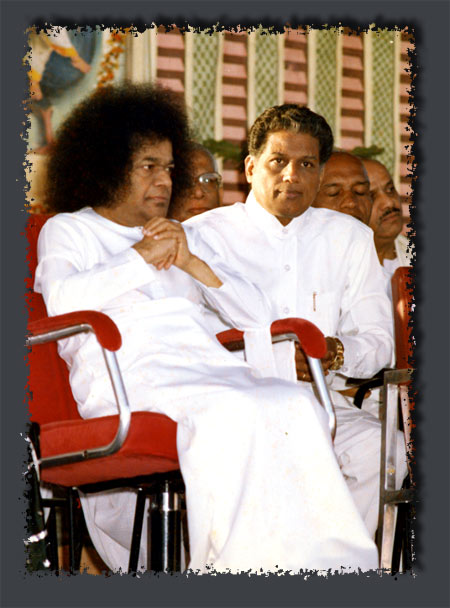 |
KM: But these institutions require upgrading, expansion.
K. Chakravarthi: Yes, that is why it is important to understand that the role of these institutions in future is to continue to serve the way in which it is required. And in basic economic terms, every successive year is going to mean little more expenditure given the increase in the cost and the inflation.
Every institution will have to really go on providing for more; at the same time, it's not as though it's only the expenses, the income or the people, the growth in the economy, the number of people... There is a desire on the part of many to participate in a very noble cause. And when it comes to a question of Hospitals and University, I am sure that the devotees whether in this country or in various parts of the world would see in the same manner in which they possibly saw when Swami was with us.
I do believe that over a period of time, the continued sustenance and maintenance of the Hospital as providing first-class service free of cost would really bring in a great response from them. It has a resonance of its own because it has been set up by Swami, it has been guided by Swami, it has been run by Swami and has been provided for by Swami.
Therefore, I think the connect between the vast assemblage of devotees and these institutions will continue for a long time. It's not merely a question of knowing Swami in person; it's a question of being able to identify with all that He stood for. The coming generations certainly would not have seen Swami physically, in flesh and blood but I think the legacy that is there would really be a part of the legacy of mankind as a whole.
And in that sense I think the devotees, let's say of the next generation or a generation thereafter, would continue to look upon these institutions as providing them an opportunity to identify themselves with a very great noble task. And if they're going to do something good in their own lives, this would certainly hold a very high position in their own scheme of things.
A Life of Servitude
- an exclusive conversation with Mr. K. Chakravarthi
- an exclusive conversation with Mr. K. Chakravarthi
PART 3
Trusting the Trust after the Mahasamadhi
KM: That's reassuring to hear. But there's a question on people's minds. These are great projects and this is good news, but ever since the Mahasamadhi has there been any drop in the contributions coming from devotees to support these projects?
K. Chakravarthi: You see it is expected, I suppose. Anything which is so huge as the Mahasamadhii is not merely a transition... it is historic.
It is something of a totally different nature. Now, it takes time for people as they have their own response mechanism. Some are able to come out of it quickly, some take a longer time, some feel that if there is no presence of Swami, what is there in that place. Some feel that visiting a place itself is really going to give them a sense of being close with Swami. Human beings differ in their responses, their reactions, also in the time for recovery.
So I think given the fact that it is a huge difference between having Swami in His physical form and not having Him; it is traumatic for many people, it's not easily explained. I think those who have gone through as the devotees would understand what I say because what has affected me must have equally affected everyone.
KM: And grieving is a process.
K. Chakravarthi: That's why I said some people are able to get over that faster than others. Some people perhaps are thrown into situations they find extremely difficult to get out of. But I'm sure with Swami giving them the necessary strength to get over, it's a question of time. So any fall in the people's contributions towards these, yes I think is understandable. But I do think that when people see that these activities are carried on in the same spirit of service.
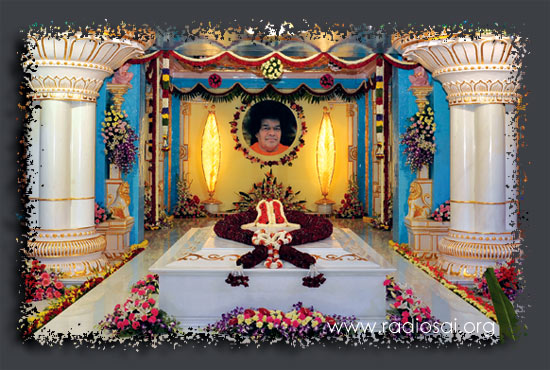 |
KM: With further growth and expansion happening...
K. Chakravarthi: Yes. Look at the way in which the hospitals' work is going on for the last 18 months, for instance; there is no drop in any figure. All parameters, in fact, have registered a slight increase. Look at the university. Look at the faculty, look at the students. No way is the commitment to the cause of higher education now less than or in no way is that commitment to Swami, His ideals, His mission, less.
I think Swami’s mission is not defined by His physical presence alone. That is yes a very important thing; it has been especially for us, this generation which has been contemporary of the Avatar but I don't think we can circumscribe Him, to this limited period of time. If you look at the general span of time, the physical existence of any person, even the divine manifestation, is limited. It could be decades but not centuries.
If you look at the institutions that have been built by them or by Him especially, I do not think a second of this nature is there in the history of humanity.
But if you look at the certain institutions which have been growing over centuries... clearly, these hospitals, this university, etc., will have a time span of centuries. So if the divine manifestations limited itself to a few decades, the institutions which embody His spirit will last for centuries. And if it comes to a question of His message, it will be for eternity. It is timeless. Therefore, to think of these things in a timeframe with which you are accustomed is not correct.
KM: Very myopic indeed.
K. Chakravarthi: So I'm sure these institutions will continue to inspire generations of people to come. And I think people would like to be a part of that great endeavour, that history, that tradition of service. I think these institutions will be a rallying point for many, many people to come. And we believe that there will be a connection which Swami will establish between Himself and the successive generations that come to inhabit this world.
Sustaining the Central Trust's Vibrancy and Perpetuity
KM: Now a more mundane question. What happens if a member of the Central Trust chooses to retire? Is there a mechanism within the Trust to ensure perpetuity and induction of new blood?
K. Chakravarthi: As it happens in Trusts, the existing trustees will have to propose and if it's approved by the people concerned, then invitation is sent to the person concerned to join the Trust board. This is like any other Trust or any corporate body. So when a situation arises, when there is a need for somebody to be inducted, a process of that nature would come into existence.
We should be in a position to think amongst ourselves who could be invited and of course we also should know about his willingness to serve. These are normal things which happen everywhere and depending on that, we will have to take a decision about formal induction and then extend it by invitation and then welcome him to the Board of Trustees. I think these are processes which will come.
KM: Will it always be a ‘him’?
 |  |  |  |  |  |  |  |
| Mr. Chakravarthi participating in the convocation ceremony as the Registrar of Baba's University | |||||||
K. Chakravarthi: If you look at even the Council of Management which was there when Bhagawan was a sole Trustee, Rajmata was there as a member of the council; she was a very venerable person. And then we had Justice Padma Khastagir from the Calcutta High Court. So it is not as though Swami has made any sort of hard-and-fast rule that men alone can be... I don't think. And even if you take the governing body of the University, a distinguished Vice Chancellor lady would come there.
So as far as the Trust is concerned, I think gender will not be a factor because if you go by history, the way in which Swami Himself has inducted the Council of Members when He was a sole trustee would be a pointer.
KM: That's excellent to know. Now at the time of the Mahasamadhi, we saw the whole world descend into the valley of Prasanthi Nilayam but a few months later, there appeared to be a drop in the size of the congregation. Did it worry the Trust at any point in time?
K. Chakravarthi: It is not a matter for Trust alone because as I said, it takes time for people to rebuild their lives. You see, when a thing of that nature happens like Mahasamadhi, people consider it as the last sight of the physical frame. Now that cannot be compared with normal days when people come and go. So that was I think the last homage paid to... the physical expression of divinity.
So that was a totally different thing. That's why you would have seen that for hours together people marched past, filed past….
KM: Lakhs and lakhs for three days.
K. Chakravarthi: And these are people from rural areas, mostly; some of them from semi-urban areas, etc. Many of them might have come off and on but then, that occasion must have brought them because it is a question of being the last time to see. Therefore, that itself shows that these are the people who are going to be the vast assemblage of devotees.
 |  |  |  |  |  |  |  |
Coming here need not perhaps be an expression of their devotion from their point of view. We can still carry Bhagawan in our own hearts, we can stay at home, we can pray. So, there are other ways in which this expression or devotion can come. But I think as years go by, there will be a natural yearning in the hearts of many to come and breathe the air that He breathed, to tread the soil He trod and to hear the music and it is not the conventional music â€" it will be the music of the spheres.
KM: Very true. Elevating and divinely inspired music!
 |  |  |  |  |  |  |  |
K. Chakravarthi: So I do not think the fall in the number of people coming can be attributed to any factor except people having to come to terms with such a loss. And we do not know much about other places but take Shirdi for example. People say that there were very, very few people who had been going to Shirdi for decades after the Mahasamadhi. But in the last decade or more, lots of people visit the shrine, and to attribute it to any reason such as religious tourism would be rather naïve.
KM: And even irreverent.
K. Chakravarthi: But I think this can be attributed to the way in which the glory of that manifestation had touched the hearts of people. So, there is reason to feel that a similar outpouring of feelings by way of having to come and be a part of this place would also naturally manifest itself when Sathya Sai wills and decides.
KM: Everything happens as per as His game plan.
K. Chakravarthi: It will happen.
The other place that comes to mind is Tirupathi where people over a period of time have felt, possibly in their own hearts and minds, something very comforting, very soothing, something which has really made them connect with some power which they can't describe but they can experience within. And I think during the life time of Swami, He has done that - touching the hearts of many. So, when will that express itself once again in the lives of these people, will be a factor.
For people who have not seen Him at all, how would it express itself is a matter we may not be able to comment upon. I think this has to be left, this is in the bosom of time, but I think time will reveal at sometime.
Personal Journey: from IAS to SAI
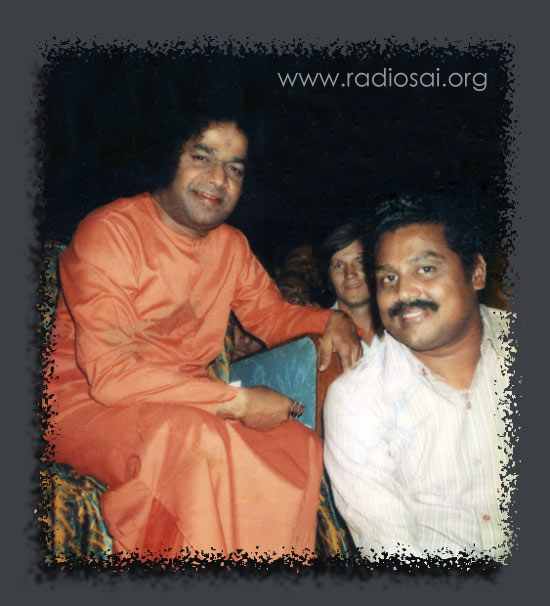 | |
| Soon after his first visit, the longing to serve Bhagawan intensified |
KM: Yes! At the right time as it did with everything that unfolded throughout Bhagawan's life.
Sir, you spoke of touching the hearts. So let's just change gears here. Obviously, Bhagawan touched your heart in 1975 and you decided to quit a very secure professional life when you were at the top of your game.
Undoubtedly, you could have gone places had you stayed in the profession that you had worked so hard to get into. Instead, you made that life-altering detour and you came to serve a master and it is actually very hard for people to believe that you live a very modest life in a 10 feet x 12 feet room for years now. At any point in time did you wonder, did I do the right thing?
K. Chakravarthi: I never questioned myself whether I did the right thing because I think deep down in me when I came here, I knew that it is the right thing.
KM: How were you so sure?
K. Chakravarthi: Because I never had a feeling that I have lost anything. I mean even if you look at it in material terms, I came to Swami for the first darshan in '75. Now when I was transferred to Hyderabad, Swami gave us a huge building.
KM: I believe a former palace.
K. Chakravarthi: Yeah, it was some Nawab's palace which Swami had bought and we started the school there and it was a huge place with Swami's grace. He made my wife as the Director and Correspondent at the school and He said that it would be good if she stays somewhere here because otherwise time is lost in transit. And Swami told us that “Until now you have lived in rented government accommodation; you are living in your own house now.�
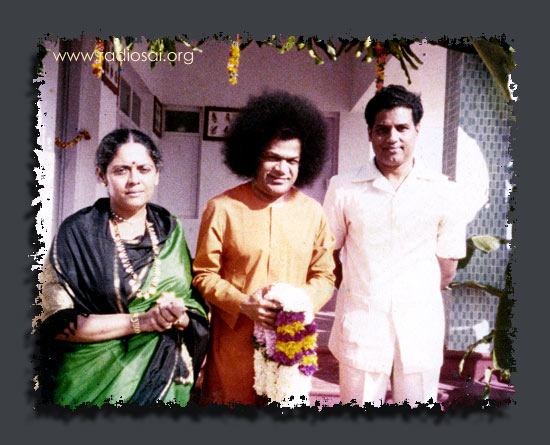 | |
| Mr. Mrs Chakravarthi with Bhagawan outside their new official residence |
KM: And He came and stayed with you twice in that house!
K. Chakravarthi: Yes He did. So that's the reason why I think we never felt that as though we had lost something; we have gained and I mean even in material terms. Then when we came here, and it took quite a bit of time for Him to give me permission to leave (government service) and come. And when He finally gave His permission to come and I joined as a Registrar, He built a house separately and I think it was a beautiful house...
KM: Yes, where the Sri Sathya Sai Mirpuri College of Music is located now.
K. Chakravarthi: That building is no longer there but it was a very fine place, very roomy, airy, everything that one could think of. I think I would not have been able to construct a better house than that; that is what Swami gave and I think He not only gave a house to stay, He also dropped in occasionally to be with us there. And more than that I think that was the first time both my children stayed together. You see, the first son was studying somewhere and the second son was studying; that was the first time when both the children could be together because they were students of this university.
If I had been working somewhere else, I suppose they would have gone to different universities or different places. And when the children were there or even when they left, Swami said that every day it was my responsibility at the time to visit the hostel and I used to be there after my dinner between 8:00 and 9:45 at least, because then the bell goes and they have to go for the night prayer. So I normally used to be there between 8:00 and 9:30 PM, invariably every night of my stay in the university.
 |  |  |  |  |  |  |  |
| Bhagawan visiting the Chakravarthi residence that He specially constructed for them | |||||||
And I think I knew many of them personally and I suppose one reason I did not miss the children was because I was in the midst of all the children there â€" from the undergraduate to the postgraduate, and the research scholars.
So, I think it was the ambience there that gave you a feeling that you are a part of the very large family where the children grew up; usually you get so much delight in seeing them grow and by knowing their background; of course, Swami knew the background of everyone I suppose and He used to ask me “Did you see this person, that person, that boy, this boy?� I mean it was always necessary for me to keep knowing these boys, not as well as Swami would know them but at least as well as I should.
Serving Beyond the Call of Duty
KM: And you have an incredible memory. You remember almost every person's batch and year of graduation.
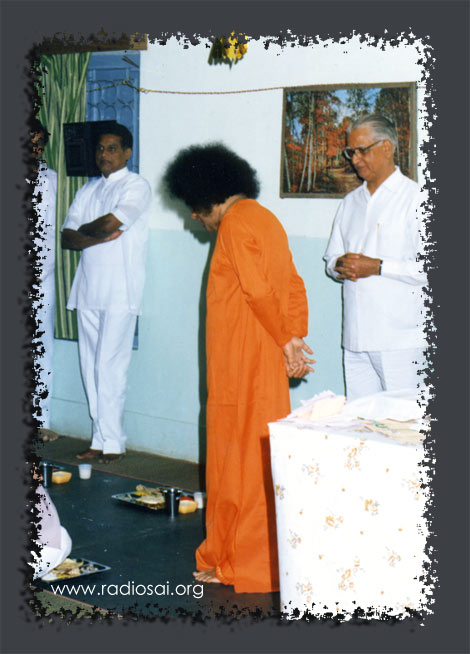 | |
| The divine Chancellor visiting the hostel, flanked by the Vice Chancellor, S. N. Saraf and Registrar, K. Chakravarthi |
K. Chakravarthi: Well that was again because of the need to report to Swami I suppose. I may have had a fairly well-endowed memory but Swami used to show His concern for the children because boys would write letters to Him saying that they are unwell or the father is not well, the mother is not well or something.
So I used to go into His room and He would say, “Ah, did you see this boy?â€� So I used to really make a point to go and see the sick boys so that I got to know who is down with what sickness. So even before Swami asked I would say “Swami, yes I saw these people. These are the boys since past three days, four days, and this is what happened â€" basically report on each day of the student’s illness.â€� So the idea was not that Swami cannot know. This is more a question of all the functionaries in this organisation knowing as much as they ought to, about the well-being of the students.
KM: And I can't think of any university where the Registrar goes to the hostel and bonds with the students.
K. Chakravarthi: That is because of the extraordinary close connection between the Chancellor and the students.
K. Chakravarthi: That is because of the extraordinary close connection between the Chancellor and the students.
The Registrar has to maintain at least at the physical level, not at perhaps the heart level which Swami used to but at least at the physical level I should know. I took great pleasure also in doing so; I never considered it as a great responsibility. It was so natural to me; I would know the grades of almost all of them. I would know who were the outstanding graders.
And that is also because of my desire to know as many as possible and be of some help to them. I don't think any Registrar of any university will have this because the warden of the hostels in conventional universities may have a great rapport with the students as their pupils.
But here Swami would know not only the student but also the grandmother of the student or the grandfather or the father or the uncle. The whole thing was something like a great family in which you have some little role to play to help them, to be of use to them and to bring it to the notice of Swami, which I think was very important. Not that He is not aware but I think it is also the responsibility of the functionaries to keep Swami, in His capacity as the Chancellor of the University, informed of the welfare of the students.
So I enjoyed that. It was good. Looking back I think that has kept me young. In mind, I never felt old because I was in the company of the young growing children.
Bonding with the Divine Chancellor
KM: I recall as a student watching our first Vice-Chancellor Dr. V. K. Gokak and yourself make a beeline to Bhagawan's personal quarters before every darshan.
K. Chakravarthi: Yes, He had given us a time. In those days, early days of the university, our time was 6:40 to 7:20 AM the morning.
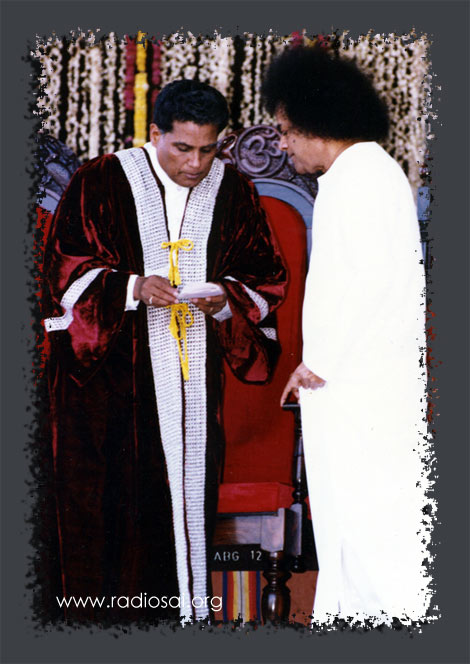 | |
| Reporting to the divine Chancellor as Sai University's first Registrar |
KM: And then again in the afternoons!
K. Chakravarthi: Yeah! At 6:30 PM, I used to come; together the Registrar and the Vice-Chancellor used to go up and keep Him informed of what had happened the previous day. And in the early days Swami was very keen to know everything â€" about the Governing Body, structure, work, Academic Council, the Boards of Studies, the way in which people are recruited and often times He used to come and sit in the Selection Committee during the selection of a professor or reader and things like that.
His presence made everybody take it as seriously as one should. Even otherwise one would have done it perhaps because of a certain professional interest but His presence endowed all these proceedings with a certain not only seriousness but also with a sense of commitment. When Swami could spend so much time building up the institution, all the concerned people should equally give that much time. So this is how everyone felt during the early days of the university while the infrastructure was still being built up.
And I remember when I came here to start my work as Registrar, there was no stenographer in the office and I had to go back to my old times as a student to write in longhand whatever notes I had and then get them typed. So it was something totally different from what I was accustomed to â€" having two or three stenographers around and I would dictate work and felt that I have done the day's job. Here I was supposed to take some white paper, write in longhand and giving it to one typist and he still had to get a new typewriter at that time. Looking back, there was a great sense of growing in those days, in a new atmosphere and we are part of the great history.
KM: Of course, one day, looking back, people will scarcely believe this actually happened.
K. Chakravarthi: The commitment to every small little detail, is what people working in any capacity with Swami would have developed. That's why I think anybody would carry that as part of their tradition ... whatever commitment they want to give in their life, they would certainly like to take upon themselves this great responsibility to attend to every bit of detail.
That's why I feel that these institutions which Swami has built almost every day of His stay here with us â€" they can't be taken lightly by anyone. So today or tomorrow or even day after, I am sure people are going to look at them as the visible embodiments of that everlasting spirit.
A Life of Servitude
- an exclusive conversation with Mr. K. Chakravarthi
- an exclusive conversation with Mr. K. Chakravarthi
PART 4
The Privilege of Reporting to Boss Divine
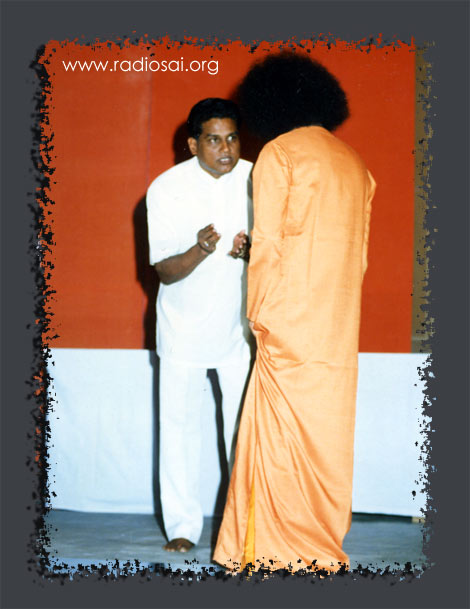 |
KM: In your position as a Registrar or as the Secretary of the Trust, while Bhagawan was in the form, you reported directly to a being that millions believed to be Divine and your boss was God for all practical purposes. What does it take to report every morning to a Being who is omniscient, omnipotent and omnipresent for millions?
K. Chakravarthi: Well, I think it was the personality of Swami which made us believe that He is a human being, that made us, I suppose work in a way in which we could work as human beings.
KM: Otherwise, you would be petrified?
K. Chakravarthi: Yes, many of us would have seen, the way in which Swami interacts. You would get an immediate feeling that there is someone who is so totally aware of you and knows everything, all right, but He still wants you to do, to learn and to report. In fact, on an occasion when I said “Swami knows everything�, He used to say “Swami knows everything but I want to know whether you know everything about our institute.� (Laughs!)
So one can't say that Swami knows everything and keep quiet. Then on another occasion, He said, “Well, if I know everything, why did I keep you?� You ought to know yourself.
It is not as though Swami knows and you do not need to know anything. So, I think all these things made you feel that you have to work in a way which I think fills the role and He never gave an impression that you are in the company of someone who is not open to your submissions or your understanding of the problem and seeking some degree, some light from Him whether the one which we are suggesting is the right one, and number of times I think we used to go and say “Swami, this is one way of doing it; this is another way of doing it� and we leave at that. He says “Do this or don't do that� or something.
So, over a period of time, you know that you are getting all the support, all the guidance but at the same time, you do not treat Him as a human being who knows more than you. It is something beyond that. There is some force, and therefore you treat Him as something far, far above a human being even in the normal course of things but we have come to believe from the beginning that here is a Divine Being with us. Prof. Gokak used to say, “I roar like a lion when I am outside but I become a lamb in His presence.�
I think that summed up the attitude. You know you may be anything but in His presence… it was always a question of learning to submit or trying to do what pleases Him and avoid what doesn’t please Him and He could be very forceful in rejecting things which possibly we have even unknowingly done.
That's why you talk of perfection. What is perfection? How do you define perfection? So it is only in adherence to the right thing in the small matters that builds up a capacity to do the right things in the right way.
That's why you talk of perfection. What is perfection? How do you define perfection? So it is only in adherence to the right thing in the small matters that builds up a capacity to do the right things in the right way.
 |  |  |  |  |  |  |  |
| Early years of interaction with Bhagawan, during his weekly trips from Anantapur | |||||||
Until it becomes a part of our nature to eschew the things which should not be done, to do things which need to be done...it has to become a part of our own personality and I think many, many people who have had occasion to be with Swami would have felt like that.
Balancing Family within a Life of Servitude
KM: Mr. Chakravarthi, the kind of commitment you have demonstrated while serving in these positions required you to spend many hours on the job. I don't think you travelled outside the ashram for decades at a stretch and you were always available to run this place and do whatever Bhagawan wanted you to. This must have taken a toll on your family life?
K. Chakravarthi: Luckily, I suppose, when the children finished studying here, Swami blessed them to go and have their education abroad and we knew that that is a part of life. The children had to grow, like the birds, and leave the nest, that's all right.
So far as my wife and I are concerned, I supposed she was committed to Swami more than me. Therefore I didn't have any problem to convince her that we have to stay here because of this commitment or that commitment.
Secondly, the air of peace and tranquillity here which she enjoyed, in those earlier days … she was so keen to have the morning darshan, evening darshan and in those days Swami used to come right on time. So, I used to come at 6:30, see Swami, go back and drop her before I go to the college and we did it for some time.
Then Swami said, “Now he has lot of work; so come only in the evenings.� And she was quite upset because, you were losing one darshan. But she knew that time was precious because everything has to be cut very fine. So in the afternoons, in those days Swami used to come down by 3:30 or 3:45. I used to come again in the afternoon to see Swami around 1:15 or 1:30, go back by 2:30, pick her up, drop her before 3:30 and go to the college.
 |  |  |  |  |  |  |  |
| Offering a bouquet to Bhagawan as the Secretary of the Centeral Trust, during the Trust Anniversary Day | |||||||
And by the evening if you come Swami would ask you “Have you done this work?� He would have told me at 2:30 perhaps; He would expect me to meet Him at 5:20 or something like that. So, sometimes, you can do but sometimes people are not available to talk to and things like that. So, it is always a question of having to do things which need to be done in a very specific rigorous time frame.
KM: Did you feel stressed at times?
K. Chakravarthi: This is one of the great things or the blessings of Swami not only for me, but for many, many people who would have worked with Him, as the strain perhaps was taken away by Him because I don't think at other places people would have been able to work, continuously for a long time.
KM: And no weekends, no holidays?
K. Chakravarthi: No, in fact the weekends were busier because most people used to come on Saturdays and Sundays to have His darshan.
Very often we didn’t know whether it was a Monday or Wednesday, and also it didn't matter because each day was a fine morning and each evening was a fine evening. I mean you are with Swami. So the artificial calendar you know Sunday to Saturday or October, November, etc. hardly mattered... every day was a day full of promise and full of joy and I think that is the way in which I think I felt that there is no strain or anything on me as far as I could recollect.
Walking a Tightrope as the Face of the Trust
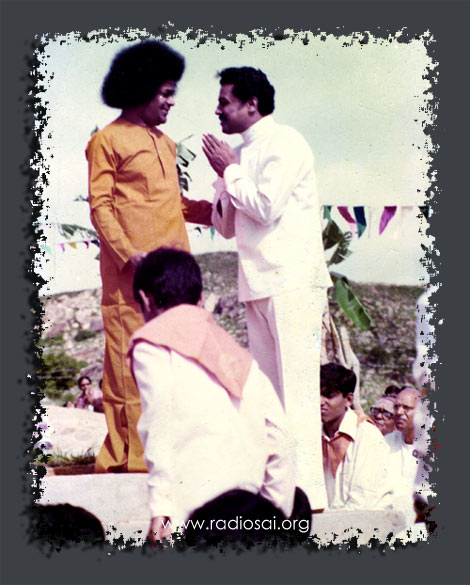 | |
| Mr. Chakravarthi during the inauguration of Sri Sathya Sai Gokulam, 1975 |
KM: Your position was very sensitive, you were many times the person between people trying to approach Bhagawan and Bhagawan Himself. Did you have to take some tough decisions and did it affect your relationship with people?
K. Chakravarthi: Most people perhaps would have known what Swami is and therefore they would have known the limitations of anyone when it came to taking any information to Swami or take instructions from Swami, etc.
I think very many people who also had to have access through the office would have also known the nature of the way in which Swami expects them to function. I don’t think I had any difficulty with anyone because I think the moment you tell I think Swami said that he would talk to you directly let us say for instance often times He will say “Vaaditho nenu maatlaaduthaanu� (I will talk with the person concerned)�. That shows that well, they know Swami would not have said when He would talk to them! So, people used to stay for another day or two or more - they plan to come for three days and then end up staying for 13 days.
It used to happen for many of them. So, they knew of the limited role anyone could play in terms of their ability to get things done in a way in which normally people expect in the conventional organisations. I think they knew that there is something that they can possibly try to convey to Swami through someone who perhaps meets Swami morning, afternoon and evening but they also know that there are severe limitations to what a person in that position can take to Swami or can bring back from Swami.
His Will, His Way - the Only Way Forward
KM: Now, given your deep commitment to the mission 24/7 for over three decades, what are your dreams for the future?
K. Chakravarthi: I wouldn't say I have dreams. I will say that I have a certain strong feeling that whatever has been set up by Swami would really bring great response from people all over the world. Although in the immediate future, people having been with Him, having talked to Him and having been blessed by Him even in personal matters are going to find it extremely difficult or are already finding it difficult and they may feel a great sense of void.
But future generations who have not seen Him would feel Him in ways in which I think contemporaries might not be feeling. Even one minute or 5 minutes staying here, will give them a sense of connection with Him, which I think is going to be a reality for many, many people.
When people visit the place and see what is happening, they will be inspired deeply and I do believe that many people who are working here in these institutions are also equally committed. In any other place, there would have been a sense of loss, leading to paralysis of action. But here, yes, a sense of loss…
KM: Yet, there's a greater drive.
K. Chakravarthi: Everyone here is saying “This is not sufficient, we must do more, we must do more.� You can't ascribe it to ordinary human feelings, you know, of loss, etc. So it's a paradox, that you feel the sense of loss but you still want to do more than what you have been blessed to do earlier.
KM: The motivation is heightened.
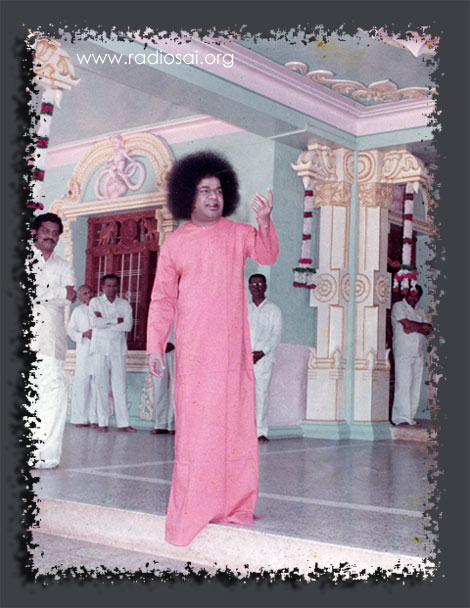 | |
| One of Mr. Chakravarthi's early visits as District Collector of Anantapur |
K. Chakravarthi: So, this is what is going to be the defining feeling amidst a lot of people working, here in these institutions and the people who are going to come and be moved by seeing that. And in their own life elsewhere also, I have a feeling wherever they are, they are going to feel that connect between themselves and Swami. That is a lasting relationship that is going to really define their lives in the context of Swami's stay here. So, I will say these are dreams. These are my strong feelings that just as He had brought people like me, who wouldn't have even dreamt of coming here... if somebody had told me when I came to Anantapur that my life is going to be in Anantapur, I wouldn't have believed myself.
So, this is what is going to happen to many people. You do not know what type of a destiny will really bring you close to Him. Well, that's what He wills... it's written somewhere.
My posting to Anantapur in itself was an accident of administration and we know administration is full of accidents. I was posted to Hyderabad, I'd asked for a little leave and then, it was granted and during that period, something happened and they said, “All right, you go there (to Anantapur).�
Now, looking back, if I'd joined Hyderabad, where would I've met Swami? Would I've come here? What would have been my life in the service?
So, I don't think that we really decide for ourselves. Apparently, yes, we take our decisions, there is something, but if you go on thinking, even that takes place because of a certain decision being made by some other force, I think in a manner in which Swami has really been bringing people to Him - a way which we wouldn't have thought possible â€" His ability to create relationships with Him is not limited to His physical frame.
Sai Will Versus Free Will â€" What Determines our Destiny?
KM: But I have a question here. You said we are not really responsible for our posting, but in your own case, there was a time when as a District Collector, you came to Puttaparthi and every single instance prior to that, Swami had met with you and spoken to you. But that particular day, He was very busy and He sent Sri Kutumba Rao to see you a number of times, to tell you how busy He was and to tell you that you could leave for Anantapur if you had work. But the message that you sent back was that you were free enough to wait.
And you consciously and specifically chose to wait and later, Dr. Bhagavantham revealed that he was with Swami the entire day and the whole drama was a test for you because Swami said if you chose that day to go back, your life would take a certain route and if you chose to stay back to see Him, your destiny would take you elsewhere. So, there was a fork in the road and you made a choice and the consequence laid out before you.
K. Chakravarthi: This is again part of the wider philosophical question of free will versus determinism. We do not know. Free will is something like a cow tied to a stick. It is given, a certain range of freedom within the lawn you have but beyond that it hasn't. Similarly, our lives are also, you know, given little freedom.
K. Chakravarthi: This is again part of the wider philosophical question of free will versus determinism. We do not know. Free will is something like a cow tied to a stick. It is given, a certain range of freedom within the lawn you have but beyond that it hasn't. Similarly, our lives are also, you know, given little freedom.
KM: Did you have no work in Anantapur that day?
 |  |  |  |  |  |  |  |
| Mr. Chakaravarthi inaugurating Sai Colony (a settlement in Puttaparthi) as the District Collector of Anantapur District | |||||||
K. Chakravarthi: It is lucky, I suppose. Looking back, I didn't give any engagement to anyone and it was a holiday. As usual, I was expecting to have darshan and get back and did not expect to stay back the whole day. But, I somehow did not provide for myself any work, any engagement, etc. So, I could send word to Swami that I'm staying here because I have no work which requires my presence there. So, how do you ascribe it? I mean, a man would have normally given some time to somebody for that day. I did not even have to call off a meeting with anyone. It just so happened that the whole day was free. So, when I look back at these things, these are the small pointers... where did I exercise my will? Where has Swami taken over? I think each one will possibly raise this question within himself or herself and then come to their own conclusion.
Influence of Mentors Role Models
KM: While growing up, who were the people who influenced you? Who were your role models?
K. Chakravarthi: In my case, I think two people really made a lot of difference.
One was my maternal uncle. He was a professor of Philosophy in Venkateswara University and later on, Madras University. Again, we do not know whether it was destiny or my choice but when I completed my schooling, I could have continued in Madras to study my Intermediate as it was called in those days; it was part of the university setup. But somehow, it so happened that he came on that day and he met my father and he said, “Why don't you allow me to take him and be with me for two years? After that, he can come back to Madras and he can do his graduation here.�
One was my maternal uncle. He was a professor of Philosophy in Venkateswara University and later on, Madras University. Again, we do not know whether it was destiny or my choice but when I completed my schooling, I could have continued in Madras to study my Intermediate as it was called in those days; it was part of the university setup. But somehow, it so happened that he came on that day and he met my father and he said, “Why don't you allow me to take him and be with me for two years? After that, he can come back to Madras and he can do his graduation here.�
I didn't know. I was young, I didn't want to but in those days, students did not say “I won't go�. Father said, “All right. Go with him.� And it so happened that that two years, I accelerated in maturity because he had a very wonderful library. He was himself a very good professor of Philosophy. He did his Doctorate in Christian College in those days when Professor Hogg was there. He had a very distinguished career.
He used to ask me, “Take any book and read.â€� And I didn't really know.... Epicurus, Aristotle, Plato and Socrates. Then, he had modern books â€" Hegel, Karl Popper's The Open Society and Its Enemies ... lots of books used to be there and he used to ask me to randomly pick a book and start reading and three days later he would sit with me and ask, “What did you understand about this book? Can you say a few words on what you have read and what you have understood?â€�
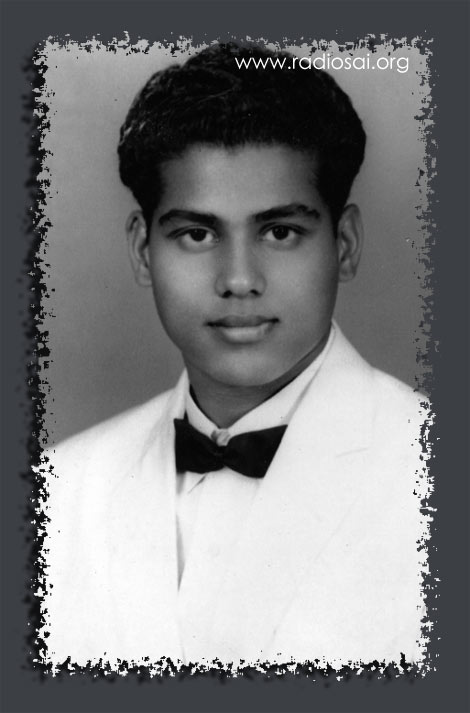 | |
| Mr. Chakravarthi at the age of 24, when he was inducted in the IAS |
I think it was a training. I was not conscious of that at that time. But looking back, later on, I found that it was easy for me to take any book which is apparently unintelligible and read it. I wouldn't say struggle with it, but at least read it and try to understand it as much as I can. The training of the mind was possible because I was trying to grapple with ideas of a complex nature, of a logic which has been worked out so tightly. So, it was something like a new journey in a mental sphere. And that stood in great stead, later on, when I had to really study much more when I came to my Honours degree and other courses.
The other one is my own granduncle Sir S. Varadachariar who was at that time a Chief Justice of the Federal Court of India, which was the predecessor to the Supreme Court.
Sir Varadachariar was a great jurist and my paternal grandfather's elder brother; we used to call him also grandfather. He was a man of great integrity, great knowledge, great wisdom and a temperament which I think made him accessible to people of all ages and at the same time, he maintained a certain distance. It is easy to become overly friendly. It is also easy to have a put off attitude, but it was a combination of ease with which he could receive people and at the same time, maintain a certain distance with the person.
I learned how you can be informal, you can be accessible but at the same time, you can maintain your own dignity and distance.
Over a period of time, I may have absorbed these lessons, mostly unconsciously. I might have possibly done the same with the students at the university, even if unconsciously. I was informal, accessible but I never gave an impression that I was to be taken advantage of.
So, I think both of them were deeply involved in Visishtadwaita â€" people who had really taken to study of philosophy in a very serious way. One was a professional philosopher; the other was a great jurist but had studied all the Sanskrit classics and literature.
KM: Sri Ramanujacharya?
K. Chakravarthi: Of course, that is that tradition we were born into. There was a great degree of devotion which I could see in people who were thoroughly Western-educated, had made mark in their own professions but there was something essentially humble, simple about them. Those things I suppose must have shaped my mind.
The Moment of Truth, So Unexpected, So Ecstatic
K. Chakravarthi: Therefore, when I saw Swami, it must have in some way led me to believe that this is the place I must really settle down in and work for… it was not a very conscious decision. It was something so very spontaneous.
I never looked back because I never had to struggle with a decision. It was something, as free as air blowing. That's what I felt when I came here. I told Swami that I'd like to come but at that time, there was no university, there was no thought of it, nothing was there except that I wanted to be with Swami. And then, He said, “Choostaamu.� (I'll see) and “later, later, later� He went on. And suddenly when He decided about the university, He sent word … Kutumba Rao phoned up and said, “Swami wants you to come 10 days earlier than what is normally scheduled.� That is how I came for the Dasara of 1981. And 10 days I stayed with Him, and at the end of the day, on the Vijayadasami day, after that lunch I was about to leave, and Swami called me in and said, “ Haan, come around now.�
KM: What a special moment it must have been in your life!
K. Chakravarthi: Yes, I think at a time when you don't expect from Swami, suddenly a blessing of that nature is given. So we don't know, we go on asking and the answer is “Wait, wait.� And then suddenly He says, “You don’t wait any longer.� You see that is a moment that is so very difficult to capture.
KM: So overwhelming. Yes.
 |  |  |  |  |  |  |  |
K. Chakravarthi: And to sort of give expression to that.
KM: Yeah. Seems like the unattainable suddenly becomes so easy that you don't know how to react to it.
K. Chakravarthi: Yes, exactly. When you feel that “Well, there's no point in asking� and suddenly without asking it's given, and that is where you start looking at it. This is the thing “Whatsoever thou pray believing, that you will receive.� That is the way in which Jesus said and that's what I think. If you pray, believing, you will receive it. But when and how are matters I suppose which are purely in the realm of the divine.
KM: If you look back and see the dots connecting, it appears as though all the forces came together to prepare you for this very important role you had to play in your life.
K. Chakravarthi: Well, I think possibly one could say that, as in the lives of many, we do not understand, you know how you are a decision maker, at many points of time. But those decisions themselves are supposedly not your decisions but something else guides you. This is a thing which you can analyze but you will never be able to find a sufficient, conclusive answer for that. So I think to receive the blessing, in great joy is itself a blessing. You must have the joy. So to have that joy which is not communicable in terms of words, and it stays with you, and that glow and that feeling persists, over a period of time. That I think is a special blessing.
 |  |  |  |  |  |  |  |
KM: I agree. Final question. Sir how would you like history to remember you?
K. Chakravarthi: I don't think I make history…
KM: That’s being awfully humble.
K. Chakravarthi: Kahlil Gibran writes, in the book ‘Jesus the Son of Man,’ ‘But those who crossed Him in mid-stream shall be remembered for crossing Him in mid-stream.' That's how I feel.
KM: Profound words. Thank you so very much for coming for this conversation Sir. Sai Ram.
K. Chakravarthi: Thank you very much. Sai Ram
~ Radio Sai Team
sourced:



